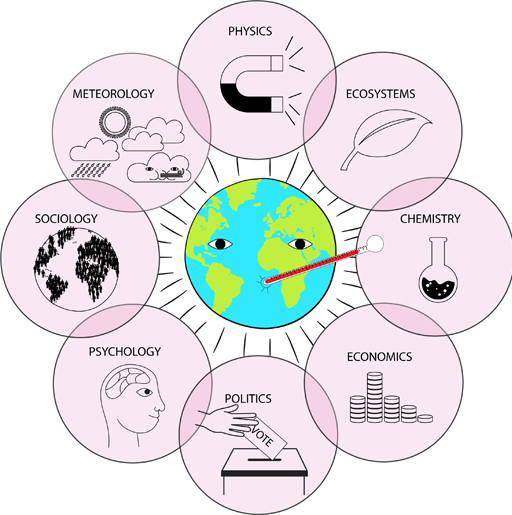6 ‘Wicked Problems’ and ‘Global Challenges’.
We should encourage arts and science to meet. I studied ancient history not technology, but you can get a long way just by being curious and asking questions.
Martha Lane-Fox, Chancellor of The Open University (Gale, 2016)
It is important to remember that the traditional academic subjects that are referred to today, such as chemistry, music and geography, are simply artificial boxes used to understand the growing awareness of our lives and universe. People have always tried to make sense of our world by trying to organise our knowledge into compartments. Over time, these compartments have changed and multiplied, and as a result, we have ended up with distinct subjects such as history, mathematics and business.
Some subjects have developed so much that they have now been divided up into new areas of knowledge. History, for example, can be broken down into fields such as archaeology, European history and Roman history. Sometimes, new areas of knowledge develop at the boundaries of more than one subject. For example, biochemistry, which applies elements of both chemistry and biology.
When a new subject is created, groups of ‘experts’ form around one area of knowledge, which can lead to a different style of language and specific notations that are unique to that area. These are used by experts in the field, as well as by teachers and students, as a shorthand for discussing a particular subject efficiently. However, this also creates barriers that prevent others from easily understanding the subject and its discussion. Learning the different languages and notations of more than one subject and bringing them together is therefore a key challenge when adopting a multidisciplinary approach to study.
Many people study undergraduate degrees within a single subject area, for example chemistry or history. There are sound reasons for this. Any subject becomes more complex as the body of knowledge accrues over time, therefore, to gain an in-depth understanding, it is necessary to study within the confines of that subject and build up your knowledge of it. However, to get the most out of the different ways each subject looks at an issue, it can often be useful to combine two or more academic subjects, taking elements from each to create a new understanding or insight.
The term Wicked Problem was first coined by design theorists Horst Rittel and Melvin Webber in 1973. They used it as a way of highlighting complexities in relation to planning and social problems. Wicked Problems are often difficult to fix because they’re interconnected. It is argued that inter and transdisciplinary approaches are the key to solving these problems. Global challenges are planetary crises such as rising temperatures, wildfires, floods, droughts, famines, wars, pandemics, and inequality.
The United Nations uses Global Challenges to frame their 17 Sustainable Development Goals (SDGs) which are a call to action for all nations across the globe to end poverty reduce inequality and protect the planet by 2030. They are about protecting the planet, and ensuring that everyone, irrespective of where they live, can enjoy health, prosperity and justice. You can read more about the UNSDGs by visiting the United Nations website. [Tip: hold Ctrl and click a link to open it in a new tab. (Hide tip)]
Although knowledge is often organised into clearly defined, subject-specific ‘boxes’, there is still a lot of knowledge that falls between these discrete categories. It is within these gaps that multidisciplinary experts work as it is clear that many of the world’s greatest challenges cannot be solved by a single subject alone. This is one of the great strengths of studying in this way, because people who have a breadth of knowledge across more than one subject can provide the glue to bring together those subjects and address these challenges. Interdisciplinary research and learning is deemed as essential in an increasingly complex world.
Studying different subjects brings a different perspective to Wicked Problems and Global Challenges. For example, climate change can be examined through a range of different subject ‘lenses’, as shown in Figure 3.
Activity 4 Applying interdisciplinary learning to different contexts
What other examples can you think of where studying different subjects could help to answer a global issue? Write down one problem and the subjects that could contribute to investigating this issue further.
Before you start to think about which specific subjects you might be interested in studying as part of your inter/multidisciplinary qualification, it is important to reflect on why studying in a multidisciplinary way might be the right decision for you and how you might be able to use this to your advantage when making academic or important life decisions, such as choosing your career.

